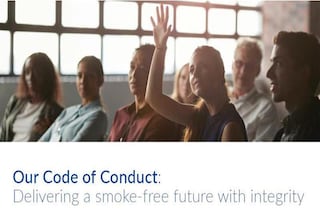Impact of COVID-19 on our activities in 2020
Steering through a pandemic with integrity
Employee communication and training
We use training and communication to help people understand which standards are relevant to their roles and how to apply them in their daily work. We reach broadly across the organization using multiple formats and languages.
Our work on conflicts of interest is an example of this multi-format approach. We drew insights from our cases, scientific research, and employee interactions, to first understand why things go wrong in this area, and what is likely to make things go right instead. We converted these insights into an online course available in 26 languages, which was deployed in 2020. It was positively received by employees and was awarded two prestigious Brandon Hall Gold Excellence in Learning Awards. This course was complimented by live training sessions (delivered virtually) addressing the topic specifically or as part of broader programs, and local and global communications to employees. On the latter, E&C shared anonymized real-life examples of conflicts of interest disclosures (the right thing to do) and real-life misconduct cases (the wrong thing to do).
In 2020, 77.7 percent of our employees received training related to topics in PMI’s Code of Conduct (2019: 86.6 percent). This was done via a total of 174,755 completed training sessions (2019: 222,533). Key topics addressed in the training sessions included workplace integrity, speaking up, responsible marketing, privacy, intellectual property, insider trading, information protection, competition law, and anti-corruption. Training for 2020 continues to be updated in the first quarter of 2021, so a slight increase in these figures is expected.
Performance highlights
In this chapter
- Impact of COVID-19
- Employee communication and training
- Speaking up
- Retaliation
- Compliance investigations
- Preventing bribery and corruption
- Next steps

Business integrity - topic overview
read moreSpeaking up
At PMI, there are many ways to speak up about potential misconduct, get help on an Ethics & Compliance (E&C) matter, ask a related question, or simply recommend an improvement.
There is a strong speaking-up culture at PMI, with most people speaking up in person. Specifically, only 20 percent of the concerns were raised anonymously in 2020 (2019: 21 percent). Furthermore, only 20 percent of reports are made by people through the phone and online helpline (2019: 20 percent), which is available 24/7 in all languages. Taken together, this indicates that employees overall feel comfortable and safe about speaking up when things don’t seem right or can be improved.
Furthermore, the E&C team increased its outreach to employees. Our “Inside E&C” initiative for example is deployed globally. It shares quarterly statistics about speaking up, violations, and disciplinary action, together with anonymized real-life examples of misconduct and advisory guidance provided in response to specific employee questions.
Retaliation
To ensure that people feel comfortable speaking up without fear of retaliation, we updated our Retaliation Check program in 2019, by integrating it into our performance and talent management processes and referring to it in our standards (PMI’s Code of Conduct and Speaking Up policy). The results were positive, as the program has helped to detect and prevent more retaliation cases than in past years. We continued our efforts in 2020, which include regular follow-ups with employees who have made a report to ensure they are not exposed to retaliation. We also run checks to ensure year-end performance assessments are fair, and we review substantial employment decisions regarding all people identified as at risk of retaliation before the decisions are implemented. In 2020, we identified 226 people who were concerned about retaliation after participating in an investigation, and we conducted regular checks to support them. We also investigated 22 allegations of retaliation raised as part of the program (2019: 190 and 37).
Compliance investigations
We take all received reports seriously and are committed to following up objectively and in a timely manner. We investigate all reports that raise compliance concerns and involve other functions or line management to help resolve other concerns. Corrective measures are implemented to address investigation findings, and disciplinary sanctions are calibrated against past sanctions to keep this process fair. Trained personnel investigate reports of suspected E&C violations according to PMI Investigations Standards designed to ensure a fair and respectful process. We run a post-investigation quality assurance program to get feedback on how well we meet these standards.
We received 756 reports of suspected misconduct in 2020 (2019: 977). Sixty-one of these reports were related to circumstance changed by the COVID-19 pandemic and included—among others—health and safety concerns, problems related to remote work or requests for advice on specific quarantine-related issues. Around 44 percent of all reports we received in 2020 did not involve a compliance allegation. Those reports were resolved through E&C advisory services or referred to appropriate departments, such as our People & Culture teams, for further action. We closely worked with the functions handling those reports, to ensure they were addressed as quickly as possible during the pandemic.
In 2020, we investigated and closed 431 cases that involved potential violations of PMI’s Code of Conduct and compliance policies (2019: 653). Violations were substantiated in 54 percent of these cases (2019: 57 percent substantiated), with “Workplace Integrity” accounting for 30 percent of all violations (2019: 26 percent) and “Theft and Fraud” accounting for 22 percent of all violations (2019: 31 percent). Corrective actions and disciplinary sanctions were implemented following these investigations. Employment termination represented 36 percent of all disciplinary sanctions in 2020 (2019: 45 percent).
Preventing bribery and corruption
Our standard is clear: We do not bribe anyone, anywhere, for any reason. We recognize that our refusal to participate in corrupt activities may make doing business more difficult in some markets, but bribery is simply unacceptable at PMI.
Our anti-corruption standards regulate our interactions with government officials and entities, as well as with private individuals, both directly and through third parties. They prohibit all forms of bribery and facilitating payments. They also describe acceptable forms of giving and receiving gifts or entertainment, govern political contributions, and set clear pre-approval, reporting and registration requirements.
We publicly disclose the very limited political contributions we make on our corporate website, and we follow lobbying regulations.
Next steps
We will continue our work to address areas of corporate integrity that require improvement, particularly as we develop new ways of working consistent with the transition to a smoke-free future and in the face of altered workplace dynamics due to the global COVID-19 pandemic.
In 2021, we will conduct the next cycle of our global Ethics & Compliance census and will report outcomes in our next Integrated Report.
We also plan to review and revise our Code of Conduct to address this changing environment, and roll out our next generation of responsible marketing, anti-bribery, and competition law training sessions.
Furthermore, we plan to expand our data analytic capabilities and integrate our results with findings from behavioral research, to enhance our capability to take preventive actions.









